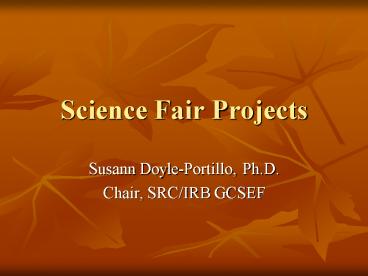Science Fair Projects - PowerPoint PPT Presentation
1 / 19
Title:
Science Fair Projects
Description:
Science Fair Projects. Susann Doyle-Portillo, Ph.D. Chair, SRC/IRB GCSEF ... Science fair projects also give students a chance to learn in a hands-on fashion, ... – PowerPoint PPT presentation
Number of Views:338
Avg rating:3.0/5.0
Title: Science Fair Projects
1
Science Fair Projects
- Susann Doyle-Portillo, Ph.D.
- Chair, SRC/IRB GCSEF
2
Why have students do a science fair project?
- Science projects can help build
- Creativity
- Motivation
- Critical thinking skills
- Research skills
- Writing skills
- Mathematical skills
- Communication skills
- Social skills (team projects)
3
- Science fair projects also give students a chance
to learn in a hands-on fashion, which may reach
some students that are not reached by more
traditional methods.
4
- At the GCSEF students have an opportunity to
compete for prizes and a chance to go to state - Prizes for 2006 have not been determined, but
past prizes have included medals, ribbons,
savings bonds, full scholarships to Gainesville
College, magazine subscriptions, t-shirts, etc.
5
Science Fair Hierarchy
- ISEF
- GSEF
- GCSEF
- Your Schools Fair
6
Getting Started
- Commit to the idea of having students do projects
- Have students volunteer
- Make projects mandatory
- You can have projects or parts of projects
function as assignments. Some schools use
projects as cross-disciplinary projects (e.g.,
language arts and science).
7
Read the Rule Book!
- State Science Fair rules are rather complex, but
once you get a handle on them, its not so bad. - As soon as you receive a card from us in the
fall, log on and download a copy of the rule
book. (www.uga.edu.oasp) - Reading the book will familiarize you with the
various paperwork requirements for different
types of projects.
8
Required Forms
- All of this is subject to change when the state
revises the rule book for 2006. - But..
- All projects require
- A Sponsor
- An Application
- An Official Abstract Form
- Form 1- Adult Sponsor Check Sheet
- Form 1A or Team 1A- Research Plan Attachment
- Form 1B- Approval Form
9
Some Projects Require Additional Forms
- Any project involving human subjects
- Any project involving vertebrates
- Any project involving blood/tissues
- Any project involving pathogens (all molds are
considered pathogens) - Any project involving hazardous materials or
devices (e.g., chemicals, including some
household radiation, welders, etc.)
10
Continued
- Any project conducted in a laboratory outside of
the school - Any project that is a continuation from the
previous year
11
These Projects May Require
- Paperwork specific to the project type (e.g.,
Forms 1C 7) - Qualified Scientists or designated supervisors
- SRC/IRB Approval
12
These Projects Require SRC/IRB Approval PRIOR to
Experimentation
- Any project involving human subjects
- Any project involving vertebrates
- Any project involving blood/tissues
- Any project involving pathogens (all molds are
considered pathogens)
13
SRC/IRB Membership
- IRB A science teacher, school administrator, a
human subjects specialist (MD, RN, psychologist,
psychiatrist, PA, or MSW) - SRC biomedical scientist (Ph.D., DVM, MD, DO, or
DDS), science teacher, and one other member - You can combine committees
- For example Psychologist, School administrator,
science teacher, DVM
14
FAQs About SRC/IRB
- Do We Have to Have an IRB/SRC?
- Only if your students will do projects that
require SRC/IRB approval. - My school doesnt require SRC/IRB for our local
fair. Can we go back and approve projects after
they have been completed? - No
- Why do we have to go through SRC/IRB approval?
- State regulations require it. It protects
everyone involved- the student, subjects, and the
school. Its good training for students.
15
How Can I Get Through This with a Minimum of
Stress?
- Read the rule book BEFORE you begin having
students work on projects. - Possibly set up an SRC/IRB at the system or GYSTC
level - Make some contacts with professionals in the
community to serve as qualified scientists
perhaps your local PTO/PTA can help with this.
16
Continued
- Direct students to do projects that require less
approval and less paper work- - i.e., no tissues, animals, humans, pathogens, or
hazardous materials/equipment. - Get parents involved. Send copies of the rule
book home. - Have students work in teams to reduce the number
of projects you sponsor
17
Where Can Students Get Ideas for Projects?
- From material covered in courses (e.g., science
or social science classes) - From their own curiosity (my favorite)
- Do brainstorming exercises with students
- From their own research
- From a science fair web site (my least favorite
because it stifles creativity and critical
thinking)
18
Project Components
- 3-sided Poster (be sure to follow display rules
listed in rule book) - Project Notebook (Contains originals of all forms
and the research report) - Log Book (Contains all notes on the project and
raw data) - Official Abstract Form
19
(No Transcript)































